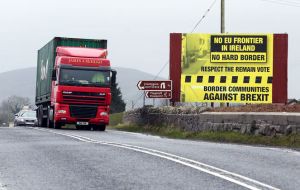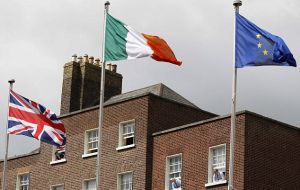MercoPress. South Atlantic News Agency
UK rejects any border posts between Ireland and Ulster, according to Brexit paper
 The UK government does not want to see any physical infrastructure at the Irish border, such as customs posts.
The UK government does not want to see any physical infrastructure at the Irish border, such as customs posts.  Ulster is the only part of UK which will share a land border with an EU member state when Britain leaves the EU in March 2019.
Ulster is the only part of UK which will share a land border with an EU member state when Britain leaves the EU in March 2019.  Brexit Secretary David Davies wants a limited period to implement any customs arrangements including considerations relating to Ireland “unique circumstances”
Brexit Secretary David Davies wants a limited period to implement any customs arrangements including considerations relating to Ireland “unique circumstances” The United Kingdom government has said it does not want any border posts between Northern Ireland and the Republic of Ireland in its new position paper on Brexit. The paper is part of its negotiations with the European Union and the broad ideas in the document appear familiar.
It says the government does not want to see any physical infrastructure at the Irish border, such as customs posts. But Brexit critics have complained that the UK's proposals lack credible detail on how that aim could be achieved.
Northern Ireland is the only part of the UK which will share a land border with an EU member state when Britain leaves the EU in March 2019. The future management of that border is a highly sensitive issue and is one of three main priorities in UK-EU Brexit negotiations.
As revealed on Tuesday, Brexit Secretary David Davies wants a time-limited period to implement any new customs arrangements, including considerations relating to the “unique circumstances” of Northern Ireland and the Republic of Ireland.
The UK government has repeated its desire to maintain the Common Travel Area and the rights of UK and Irish citizens, and to uphold the 1998 Good Friday Agreement.
The paper also dismisses the idea of a customs border in the Irish Sea, saying it would be economically and constitutionally unviable.
It recognizes that all this needs to be negotiated with the EU, in the hope that the border between the EU and the UK will be as “seamless” as possible.
An Irish government spokesperson welcomed the position paper as “timely and helpful” as it offers more clarity on the UK's strategy. However, they warned: “Protecting the peace process is crucial and it must not become a bargaining chip in the negotiations.”
Campaigners who oppose Brexit have claimed that the re-introduction of a so-called “hard border” would severely damage the Northern Ireland peace process and have a negative economic impact.
Both the UK and Irish governments have repeatedly stated their opposition to a hard border, but the situation is complicated as the UK intends to leave the EU's customs union.
UK-Ireland bilateral trade: £13.6bn worth of goods exported to the Republic of Ireland from Great Britain in 2016 and £9.1bn worth of goods exported Great Britain from the Republic of Ireland in 2016.
£10.7bn worth of goods from Northern Ireland were sold in Great Britain in 2015, and £2.7bn worth of goods from Northern Ireland were exported to the Republic of Ireland in 2015. More than 80% of cross-border trade on the island of Ireland is by small and medium-sized enterprises (SMEs)




Top Comments
Disclaimer & comment rules-

-

-

Read all commentsIs there such a thing as Tripolar disorder? I think the UK maybe the first confirmed case worldwide.
Aug 16th, 2017 - 01:22 pm +1Let me get it straight once again: want to end free movement of people into its territory but still wants freedom of goods (scenario 1), yets wants no border posts on the one border with an EU member, simultaneously also wanting a place like Gibraltar to retain most EU benefits including movement while keeping a border post (scenario 2), while in another part (Scotland), it wants Scotland to allow freedom of movement but not total freedom of goods (scenario 3)??
If it was any other country on Earth, the UK government would be sending telegrams about how such a government has utterly lost its mind. And with war less insane ideas than the ones above, like for example, keeping two or more exchange rates. Which now sounds like a so simple idea.
Freedom of goods but not people, leaving a customs union yet no border control for a land border, border control on another border yet demanding total freedom of movement and goods. Got it.
Reputations do fall off a cliff. The UK government officially has none.
Nah, this is completely normal for the EU. Currently the UK (and Ireland) is in the EU but not in the Schengen region, so you need a passport to come here from say France. Gibraltar is in the EU but not in the customs union, which is why a lot of smuggling goes on there despite the customs checks. Contrarily, Jersey and Guernsey are not in the EU and do not take part in free movement of people, but are in the customs union. Norway is not in the EU, but is in the Schengen region; it's also in the single market and allows free movement of people (not the same thing as Schengen).
Aug 16th, 2017 - 02:19 pm +1The EU is like a massive, messy Venn diagram of overlapping agreements.
The major problem for the UK is that we need to leave the customs union so we can negotiate our own trade agreements, otherwise Brexit is kind of pointless. We don't want freedom of goods but we need the border with Ireland to be frictionless because of the peace process, which means no customs checks. I suppose they will try to get round this with some kind of electronic tagging scheme, but it's completely untested and almost certainly will take a while to get working correctly.
The other option is to have NI in a customs union with the EU and a customs border within the UK, but that would just set off the unionist crazies instead of the nationalist crazies, so it's not any better.
It's not a jumble of nonsense, it's a collection of countries who can't even agree on which city or even country the parliament should sit in, let alone anything bigger. Think how hard it is to get the Hispanic countries in South America to agree on anything, and they all speak the same language and are descended from the same empire. Countries in Europe have a very long shared history of bloody wars and conquests, and all have their own cultural peculiarities that make it hard to get along. Basically, the EU is a big compromise.
Aug 16th, 2017 - 05:27 pm +1It wasn't really the mess and complications voters didn't like, but the compromise. Having to incorporate EU laws which the UK wouldn't have chosen, and which the other countries often simply ignored. The high levels of immigration, especially of unskilled labour.
Once we leave we probably will have an even more complicated relationship with the EU, if we have one at all, but if they settle it quickly it won't be such an issue because people and businesses will know what to expect. But if you think all the different zones and rules make the EU less competitive, maybe it's a good thing the UK is leaving?
Commenting for this story is now closed.
If you have a Facebook account, become a fan and comment on our Facebook Page!